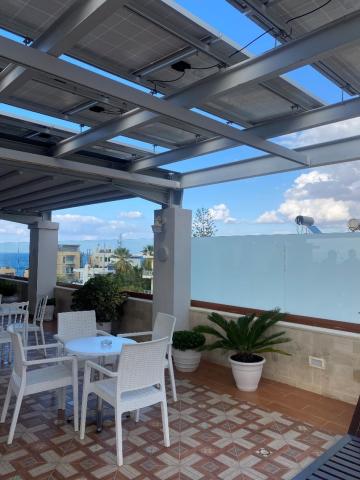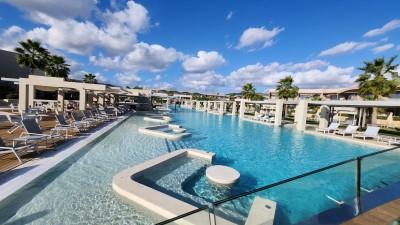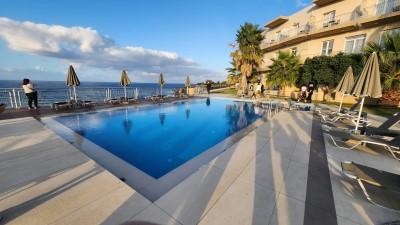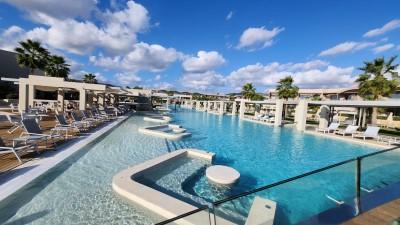Sustainable Energy Practices Crete: DETOCS Study Visits
During the 4th DETOCS Exchange of Experience Event in Chania, Crete, hosted on 23-24 October 2024 by the Mediterranean Agronomic Institute of Chania (MAICh), DETOCS project partners and their stakeholders visited three hotels — Renieris Hotel, Hotel Halepa, and Euphoria Resort — to observe their sustainable energy practices.
The Renieris Hotel (pictured above) is a small, family-run establishment located in Stalos village, approximately 7 kilometres west of Chania. The hotel has a capacity of 52 beds and covers around 1,000 m², operating for seven months each year. The Renieris Hotel has made significant investments in energy efficiency, including:
- Solar Photovoltaic (PV) and Solar Thermal Systems: A 10 KWp solar PV system installed on the terrace generates around 15,000 KWh annually, while a solar-thermal system (12 panels, 30 m²) provides 21.72 KWth of heat power for domestic hot water.
- Efficient Lighting and Insulation: The hotel is equipped with energy-efficient LED lighting. The building is well-insulated with double-glazed windows and doors, which helps reduce thermal losses.
- Modern Energy Optimisation: Renieris Hotel uses an optimised hot water system alongside energy-efficient LPG-based cooking appliances.
In 2023, solar energy contributed 32.09% to the hotel’s energy balance, resulting in a specific energy consumption of 6.90 KWh per bed-night. Despite using diesel oil and LPG, the hotel’s CO₂ emissions were kept at 23,497 kg for the year.

Situated in the historic suburb of Halepa, around 1.5 kilometres east of Chania’s centre, Hotel Halepa (above) operates year-round. Known for its historical and diplomatic significance, Halepa is home to a hotel that blends heritage with sustainability:
- Solar Energy Systems: Hotel Halepa has installed solar PV panels and a solar thermal system on its roof terrace, providing electricity and hot water to guests.
- EU Funding: Similar to Renieris, Hotel Halepa’s investment in solar energy systems was partially funded by the EU structural funds, which supported the hotel in adopting sustainable energy practices.
Located in the municipality of Platanias, around 20 kilometres west of Chania, Euphoria Resort is a luxurious summer destination with 344 rooms and suites, spanning a large area. The resort has integrated advanced energy management and renewable energy systems to maintain its high sustainability standards:
- Building Management System (BMS): The resort employs a BMS to monitor and control energy production and consumption. This smart system optimises energy usage by adjusting the power flow in different sections of the resort.
- Solar Energy and Renewable Investments: Euphoria Resort produces over 400,000 KWh of electricity annually through rooftop solar panels. Additionally, the resort has invested in a 3 MW photovoltaic park, supplying 100% of its electricity needs.
- Heat Recovery and High-Efficiency Equipment: The resort uses water-to-water heat pumps with a coefficient of performance (COP) higher than 6. It also recovers heat from its cooling systems for hot water production, supplemented by LPG.
During the study visits, participants observed various sustainable energy technologies adopted by these hotels, which could potentially be replicated in their own regions. All three hotels have prioritised insulating their buildings, including roofs, facades, and windows, to minimise energy loss. They also use energy-efficient LED lighting across their premises. All three hotels have installed solar PV systems for electricity production. Renieris Hotel and Hotel Halepa have also incorporated solar-thermal systems for hot water production.
The study visits during the 4th DETOCS Exchange of Experience Event in Chania, Crete showcased the diverse approaches taken by these three stellar hotels to enhance sustainability and energy efficiency. Supported in part by EU structural funds, their investments in renewable energy highlight the importance of both local commitment and external financial assistance in achieving environmental goals. These hotels serve as exemplary models for the wider hospitality industry, demonstrating the potential for substantial energy savings and reductions in carbon emissions.
The DETOCS project’s mission to decarbonise the tourism industry very much aligns with the efforts of Renieris Hotel, Hotel Halepa, and Euphoria Resort. Participants of the meeting left not only informed but inspired by these real-life examples of sustainable practices in Crete.


